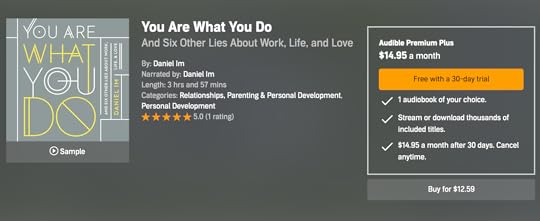Daniel Im's Blog, page 6
November 23, 2020
Succession at Beulah
A couple weeks ago, the official announcement was made that in 2021, I was going to be the next lead pastor at Beulah Alliance Church—a church that has planted more than 50 churches in Edmonton, in Alberta, and in Canada over its 99 year history.
Here is Pastor Keith’s announcement:
Here is a conversation between Keith and I about this transition:
To learn more about the backstory of our journey back to Edmonton—and how we discerned that this was God’s calling over our lives—take a look at these two articles:
The Most Important Question When Discerning Your Next StepsThe Difference Between an Opportunity and a Calling
Now that the news is public, I’d love to take a few moments to personally respond.
First and foremost, there’s no other pastor that I love and respect more than Keith Taylor. His love for Jesus, his incredible humility, and his faithful care and commitment to our church family over the past 30 years is jaw dropping to put it mildly. If you could join me in praying for him and his wife as they discern how they might serve Beulah and the greater Church in this next season of life, that would be incredible.
Next, we have a webpage that outlines everything you need to know about the transition. On this page, you’ll find a ton of FAQs about the process and what’s next.
When Christina and I were praying about coming back, God did two things in our hearts: First of all, he broke our hearts for Edmonton and for Beulah. He gave us such a deep burden and love for our city and our church. You can read about the story here.
Secondly, as we were praying and waiting on the Lord, he brought up what happened between Elijah and Elisha in 1 Kings 19. Perhaps you know the story: After Elisha was called to be Elijah’s successor, he took everything he had and surrendered it to God. His oxen, their yoke, and the plow—he burned it all up in surrender and worship to God. That was the image the Holy Spirit impressed upon my heart with this whole transition. That we were called to do the same—to surrender our green cards and to offer up the life and ministry we were living in Nashville, for what God has planned for us and Beulah here in Edmonton.
So here we are, all in, and ready to serve.
Christina and I are so excited to journey with our Beulah church family, as we together lift up high the name of Jesus over greater Edmonton because it’s all about Him. His name is the only name that matters. And he’s the one that has led Beulah for the past 100 years and will continue to lead her as we start this second century of ministry. I absolutely love the history of our church and the role that Beulah has played in Edmonton, in Alberta, in Canada, and around the world to make Jesus known.
Would you join me in praying that Beulah would continue to be a multiplying church? Please pray for God’s hand upon this time. Pray for guidance, pray for anointing upon Keith and I and our leadership team. Pray for vision, continued unity, commitment, and dedication to be a part of God’s calling for our future. And lastly, please pray for our Elders Board for this important and exciting season ahead of us.
November 10, 2020
The Fear of Not Having Enough
Or were you ever afraid of losing your job and not being able to provide? Or perhaps you did lose your job…and you’ve been struggling with the fear of failure.
When Jesus teaches us to pray “give us today our daily bread,” he’s not just talking about bread. He’s actually addressing fears that are deep within us, like the fear of not having enough.
Here’s a message I preached at my church on this very tension by digging deep into one line in the Lord’s Prayer. I pray that you’re encouraged and blessed by this.
October 29, 2020
Kings, Kingdoms, and the Election

This week before the U.S. election, I wonder what would happen if every follower of Jesus began praying, “May your kingdom come and your will be done on earth as it is in heaven.”
Because doesn’t it seem like there’s a kingdom conversation going on? Where as humans, we’re asking, hoping, expecting, and trusting an earthly king (or president) to do what only a heavenly king can do for us?
When the children of God rejected God as their king and instead demanded for a human king, God clearly warned them what would happen. See here in 1 Samuel 8:4-22 CSB,
So all the elders of Israel gathered together and went to Samuel at Ramah. They said to him, “Look, you are old, and your sons do not walk in your ways. Therefore, appoint a king to judge us the same as all the other nations have.” When they said, “Give us a king to judge us,” Samuel considered their demand wrong, so he prayed to the LORD. But the LORD told him, “Listen to the people and everything they say to you. They have not rejected you; they have rejected me as their king. They are doing the same thing to you that they have done to me, since the day I brought them out of Egypt until this day, abandoning me and worshiping other gods. Listen to them, but solemnly warn them and tell them about the customary rights of the king who will reign over them.” Samuel told all the LORD’s words to the people who were asking him for a king. He said, “These are the rights of the king who will reign over you: He will take your sons and put them to his use in his chariots, on his horses, or running in front of his chariots. He can appoint them for his use as commanders of thousands or commanders of fifties, to plow his ground and reap his harvest, or to make his weapons of war and the equipment for his chariots. He can take your daughters to become perfumers, cooks, and bakers. He can take your best fields, vineyards, and olive orchards and give them to his servants. He can take a tenth of your grain and your vineyards and give them to his officials and servants. He can take your male servants, your female servants, your best cattle, and your donkeys and use them for his work. He can take a tenth of your flocks, and you yourselves can become his servants. When that day comes, you will cry out because of the king you’ve chosen for yourselves, but the LORD won’t answer you on that day.” The people refused to listen to Samuel. “No!” they said. “We must have a king over us. Then we’ll be like all the other nations: our king will judge us, go out before us, and fight our battles.” Samuel listened to all the people’s words and then repeated them to the LORD. “Listen to them,” the LORD told Samuel. “Appoint a king for them.” Then Samuel told the men of Israel, “Each of you, go back to your city.”
Did you notice the pattern?
God clearly warned the Israelites that human kings will take, take, take, and then take some more.
In asking for a human king, the Israelites were basically saying that they wanted to go back to the kind of life that God rescued them from back in Egypt.
They were rejecting a King who gave them manna to eat in the desert, who gave them water to drink out of rocks, who gave them their daily bread, and who gave them deliverance from a life of slavery under the nations around them. And instead, they wanted to replace that King with another king who would take their food, take their water, take the fruit of their work, and take their sons and daughters for his own use.
What a stark difference.
When Jesus taught his disciples to pray, he was intentional in setting a pattern. See here in Matthew 6:9-13 CSB,
Therefore, you should pray like this: Our Father in heaven, your name be honored as holy. Your kingdom come. Your will be done on earth as it is in heaven. Give us today our daily bread. And forgive us our debts, as we also have forgiven our debtors. And do not bring us into temptation, but deliver us from the evil one.
You can read this prayer in two halves.
The first half is God-oriented, the second half is us-oriented. In the first half, which is “Our Father in Heaven, your name be honoured as holy. Your kingdom come. Your will be done on earth as it is in heaven,” Jesus teaches us to start praying by looking upward. We are declaring who and what are priority. We are reminding ourselves that we are a part of something grander and bigger than what we see with our eyes and hear with our ears. Something that started way before we were even born, and that will continue on long after we’re dead. And that all earthly kingdoms are actually subservient and secondary to God’s kingdom.
Then, in the second half, which is “Give us today our daily bread. And forgive us our debts, as we also have forgiven our debtors. And do not bring us into temptation but deliver us from the evil one,” Jesus teaches us to then pray inward and outward. To our specific needs, to reconciliation and forgiveness in community, and to freedom from our hurts, hangups, and habits.
When we flip the order of this prayer, and start with our needs before understanding who and what are priority, we end up sounding like the babblers that Jesus specifically taught his disciples NOT TO BE in the previous verses (Matthew 6:7-8).
In prayer, when we flip the order and start with our needs, rather than starting with worship, this is what happens: Our needs and wants will begin shaping our worship, rather than our worship shaping our needs and wants.
And when this happens, we’ll begin forming and fashioning a king or queen in our own image, and then forming and fashioning a kingdom in our own image. And then we’ll start praying may my kingdom come and my will be done on heaven as it is on earth.
When we get the order wrong, our needs and wants will begin shaping our worship, rather than our worship shaping our needs and wants.
Click To Tweet
Does this sound familiar?
For generations, this is what happened with the Israelites, before and after this point when they asked for a human king. This is why—despite such clear warning from Samuel—I believe the Israelites went ahead and replaced their heavenly king with an earthly one. And also why this is still happening today.
Just think about what’s going on in the U.S. right now with the election.
Doesn’t it seem like there’s a kingdom conversation going on?
Where as humans, we’re asking, hoping, expecting, and trusting an earthly king to do what only a heavenly king can do for us?
Are you asking, hoping, expecting, and trusting an earthly king to do what only a heavenly king can do for us?
Click To Tweet
In fact, I wonder if the increasing polarization and tension we’re seeing in our culture is precisely because we’ve replaced our heavenly king with earthly kings, who take, take, and take and just keep on letting us down and disappointing us.
What do you think would change, if in our prayers and in our lives, we got the order right by laying down that inner longing to be king? And any tendency that we have to bow down to an earthly king?
Where—before we even asked for anything or brought up our needs and our wants—we prayed, “May your name be honoured as holy. May your kingdom come. May your will be done.”
How do you think we would change? And the desires of our hearts would change? And the election would change?
Friends, in the end there are only two types of people in this world (I’m paraphrasing C.S. Lewis here).
Those who say to God, “Your kingdom come and your will be done.” And those to whom God says, “Your kingdom come and your will be done.”
Which one are you?
Which one do you want to be?
There are only two types of people in this world: Those who say to God, ‘Your kingdom come and your will be done.’ And those to whom God says, ‘Your kingdom come and your will be done.’
Click To Tweet

October 11, 2020
The Measure of a Sermon

Disclaimer: This article is written by a preacher for fellow preachers. If you are not a pastor, I hope that this will provide you with insight to know what your pastor might be feeling after preaching.
“You’re either a winner or a loser.”
While that statement might be true for sports, it’s not true for preaching. The measure of a game—like hockey, football, or basketball—is ultimately determined by the number of points scored. Sure, some games might be more memorable than others because of particular plays, or extraordinary efforts by certain individuals. But when all is said and done, it actually doesn’t matter how many points one team scores, unless they’ve scored more than the other team. In other words, unless there’s a loser, there is no winner.
This obviously doesn’t apply to preaching, right? …or does it?
I recognize that your average church doesn’t have a massive Jumbotron or scoreboard in the auditorium, but why does it still feel like there is one?
Let’s just think about this for a moment, if there were an actual Jumbotron, what would be considered a “goal,” or a “point scored” in preaching?
A compelling introduction?A joke that causes the congregation to laugh hysterically?An illustration that cuts to the heart?A heartfelt story?A Hebrew or Greek word?A deep insight from the Scriptures that most were unaware of?A sticky statement?A clear application point?A timely or relevant message?
Now I get that most pastors aren’t preaching to a room full of clipboards where they are being graded on their message—like in a seminary class—but why does it sometimes feel like this is the case?
Here’s my hypothesis: It’s because we live in a world where free speech has been emboldened through technology.
We live in a world where free speech has been emboldened through technology.
Click To Tweet
In other words, people will type things out on email, on social media, on Amazon, on forums, and in comments that they would never dare to say face to face to that person directly.
It’s actually quite disturbing.
And unfortunately, I see and hear this happening more frequently to preachers—myself including.
The problem with all of this is that negative comments hurt so much more than the blessing of positive comments. It’s the negative ones that hurt, cut deep, and sting.
Now I’m all for feedback, but I’ve found that it’s only helpful when it’s done in person and in conversation—face to face—when there’s a relationship. There’s too much that can be left up to interpretation when “constructive criticism” is sent via email, message, comment, or through some other means that’s not face to face.
Feedback is only helpful when it’s done in person and in conversation—face to face—when there’s a relationship.
Click To Tweet
So what is the “proper” measure of a sermon?
Can some sermons be scored as “winners?” And others as “losers?” And if so, what would be considered a legitimate point scored?
Here’s the thing—no matter how many hours you pour into sermon preparation—and no matter how you feel after you preach, you will always have people on either side. Some are going to love it and some are going to hate it—and let you know about it through a scathing email.
The measure of a sermon should never be tied to the number of positive or negative comments or emails you receive. If so, you will always lose. Always.
The measure of a sermon should never be tied to the number of positive or negative comments or emails you receive. You will always lose. Always.
Click To Tweet
Instead, the measure of a sermon should always be tied to whether or not you faithfully preached the gospel and lifted high the name of Jesus.
I love what it says in Colossians 1:28, “We proclaim him, warning and teaching everyone with all wisdom, so that we may present everyone mature in Christ.” (CSB).
In fact, here’s the thing. The more you challenge your congregation by preaching the whole counsel of God—without shying away from hard topics—the more criticism you’ll hear. This is because “the word of God is living and effective and sharper than any double-edged sword, penetrating as far as the separation of soul and spirit, joints and marrow. It is able to judge the thoughts and intentions of the heart.” (Hebrews 4:12 CSB).
The more you challenge your congregation by preaching the whole counsel of God—without shying away from hard topics—the more criticism you’ll hear.
Click To Tweet
Heck. How many times did Jesus receive criticism, and he was the Son of God!! Just think about the time when Jesus preached in Nazareth and everyone in the synagogue got up and tried to throw him off the cliff (Luke 4:28-29).
In fact, instead of being offended or hurt when we receive criticism, what if we actually expected it and considered it joy?
Just take a look at these verses,
I solemnly charge you before God and Christ Jesus, who is going to judge the living and the dead, and because of his appearing and his kingdom: Preach the word; be ready in season and out of season; correct, rebuke, and encourage with great patience and teaching. For the time will come when people will not tolerate sound doctrine, but according to their own desires, will multiply teachers for themselves because they have an itch to hear what they want to hear. They will turn away from hearing the truth and will turn aside to myths. But as for you, exercise self-control in everything, endure hardship, do the work of an evangelist, fulfill your ministry. (2 Timothy 4:1-5 CSB)
If you’re a preacher and never hear criticism, I wonder if you’re simply just saying what people want to hear? And according to this passage, just tickling their ears?
If you’re a preacher and never hear criticism, I wonder if you’re simply just saying what people want to hear?
Click To Tweet
Because after reading the Scriptures, and considering the emboldened times that we’re now living in because of technology, I’ve come to the conclusion that criticism is going to be a part of my ministry.
I will never ever shy away from preaching the word by correcting, rebuking, and encouraging with great patience and teaching. And I know that when I do so, God’s word—through the Holy Spirit—will make individuals come face to face with things that they might be uncomfortable with because “the word of God is living and effective and sharper than any double-edged sword, penetrating as far as the separation of soul and spirit, joints and marrow. It is able to judge the thoughts and intentions of the heart.” (Hebrews 4:12 CSB)
I have decided that I need to exercise self-control, endure hardship, do the work of an evangelist, and fulfill the ministry that my Lord Jesus has called me to. I will not let the enemy tear me down or discourage me because I’m convinced that the measure of a sermon has nothing to do with feedback—positive or negative.
The measure of a sermon has nothing to do with feedback—positive or negative.
Click To Tweet
“Lord, here I am. Have your way in me. Speak to me and through me to bring you honor and glory. I am your servant. In the name of Jesus, Amen.”

October 7, 2020
You Are What You Do – Audiobook

As a podcaster, recording an audiobook was such a fun experience. If you find that you don’t have the time to sit down and read, I know that you’ll love listening to the truths inside of my newest book.
If you aren’t already on Audible, click here to get a free trial and download my audiobook for free. Otherwise, click here to see all the different ways you can grab a copy of the book (paperback, kindle, or audible).
Here’s the summary of You Are What You Do: And Six Other Lies About Work, Life, and Love
The way that we’ve done things for centuries has been unsettled and unseated. We’re living in a new normal. And while on the surface many of these changes look like the next best thing, there’s actually a complex and fragile web of lies holding it all together:
You are what you do
You are what you experience
You are who you know
You are what you know
You are what you own
You are who you raise
You are your past
In You Are What You Do, author and Pastor Daniel Im considers these seven lies and the context that causes them to flourish. Through personable stories, research, and pastoral insight, Daniel will show you how to recognize these everyday lies in your life so that you can discover the truth on the other side. The truth that leads to freedom. The truth that moves you from surviving to thriving. The truth that will unlock a life of purpose, adventure, meaning, and destiny.

September 28, 2020
Do You Have a Culture of Co-Signers or Authorized Users?

Everyone on your team is either a co-signer or an authorized user.
You might be familiar with the difference between the two — especially if you are a parent to a young adult, or if you’ve ever needed help building your credit. A co-signer on an account takes a shared responsibility for payment, but an authorized user simply has access to the credit line. While this is typically a financial conversation between parents and children, within this concept lies a powerful leadership lesson for anyone leading a team. Every employee is one of the two. Which would you rather have?
Would you rather have a team of co-signers or authorized users?
Click To Tweet
In other words, are you building a culture of co-signers or authorized users? It’s quite simple to tell the difference. You know you have a team full of co-signers when everyone feels a personal attachment to your mission, vision and bottom line. And I’m not talking about individuals who have equity in your company — I’m referring to employees, not shareholders.
When you have team members who care about the soft side of culture building and organizational health — and they’re not in your HR department — you know you’ve built a team of co-signers. And when your team is willing to roll up their sleeves, double down on projects and make personal sacrifices in the face of low projections, you have a team of co-signers.
A team of authorized users looks quite different. They might be worried about the consequences of a bad quarter, but they’re not willing to go beyond their scope of work unless you talk about overtime pay or some sort of incentive. Authorized users would obviously like a positive work environment, but if something needs to be fixed, it’s someone else’s problem. And if a team member is willing to jump ship to a competitor, regardless of how much you’ve invested into them, you know they were an authorized user.
Here are three tips that will help you cultivate a culture of co-signers:
1. Envision, don’t task
As the leader, always start with the why. I know it’s easy to go straight to the what or to the how, but without starting with the why, you’ll never cultivate a culture of co-signers. Authorized users don’t care about the why because they’ll feel like it’s wasting their time. It’s “above their pay grade,” and they’ll feel like it doesn’t actually matter. However, co-signers feel personal responsibility to your company, so they want to know the why behind the what.
Without starting with the why, you’ll never cultivate a culture of co-signers.
Click To Tweet
2. Develop, don’t dump
When you’re busy, the quickest and easiest thing to do is to dump work on your team. You’re their boss, after all, so they have to do it. However, if you want to cultivate a culture of co-signers, you need to develop your team so that they are able to anticipate and pick up the work before you even feel like you need to assign it. The only way you can get there is by investing in and developing your team. Develop them with the skills and competencies you have so that they are able to do what you do. And don’t worry about losing your job or being replaced, because I’ve never met anyone who has been fired for being an expert people developer.
You’ll never be fired for being an expert people developer.
Click To Tweet
3. Share, don’t tell
Authenticity beats autocracy every day. No one is willing to go the extra mile for a dictator who lives up in their ivory tower. Authentic leaders who are willing to admit when they don’t know something or when they’ve made a mistake, on the other hand, will find themselves with a legion of loyal team members who will die on the hill for them. So when you need to implement change, invite your team into the process and share what you’re thinking.
Authenticity beats autocracy every day
Click To Tweet
If you practice these tips over and over again, you’ll wake up one day with a culture of co-signers rather than authorized users.
*My article here was originally published on March 27, 2020 on Entrepreneur.com

September 22, 2020
How to Live When You’re in Transition
Are you in transition? Are you living in between one thing and another? If so, then beware! Because when we’re living in the middle, we often forget the past, turn inward, and drift off course.
Here’s a message I preached at my church on living in the middle by examining how God’s people have historically navigated this tension.
September 1, 2020
What COVID-19 is Revealing about Your Church

Have you ever noticed that one of your arms is stronger than the other?
I find that most days, this goes unnoticed—it doesn’t matter if I’m lifting a box that came from Amazon, or setting up tables and chairs for an event. It’s only when I’m lifting weights at the gym—or these days in my makeshift home gym—that I recognize just how much my right arm is stronger than my left.
It’s not immediate though. I don’t necessarily notice it when I start bench pressing. It’s only when I get to my third or fourth set of reps that I start realizing the imbalance because the bar starts dipping slightly lower on my left side.
Let’s think about this for a moment.
Why do you think this is happening? Is it that my left arm suddenly got weaker? And that the weight lifting caused my muscles to deteriorate?
Or, is it that my left arm was already weaker from the outset? And when pressed, put under pressure, and tested, the true strength and health of my arm was simply revealed?
Friends, this global pandemic has not only pressed us to our limits, pressured us beyond our point of comfort, and tested us in ways that we never thought we could handle, but it’s also done the same to the church.
The church is being pressed. The church is being put under pressure. And the church is being tested.
Global pandemic or not, the church has always been a body of believers that are both scattered and gathered. We are called to scatter and share the good news of Jesus making disciples of all nations (Matt 28:18-20), but we are also called to gather regularly and be of an encouragement to one another (Hebrews 10:25). We are called to scatter and gather. Scatter and gather.
Global pandemic or not, the church has always been a body of believers that are both scattered and gathered.
Click To Tweet
This is how it’s always been since the birth of the early church.
In the Book of Acts, you see the early church gathering together to devote “themselves to the apostles’ teaching, to the fellowship, to the breaking of bread, and to prayer” (Acts 2:42). And “every day they devoted themselves to meeting together in the temple, and broke bread from house to house” (Acts 2:46). But then you see them scattering when Peter and John ministered to the man who was lame from birth, and also when they’re then arrested for teaching about the resurrection of Christ (Acts 3-4). This pattern is repeated over and over—not only in the Book of Acts—but also over centuries of church history. And it continues today—the church is still gathered and scattered.
This global pandemic that we’re living through didn’t cause the church to scatter. No, the church was already both scattered and gathered! This pandemic has simply revealed which “arm” was already weaker from the outset.
I wonder if God—in his sovereignty and providence—is allowing this pandemic to take place because he wants to reveal and remind us how scattering is just as important as gathering?
I wonder if God is wanting us to work on our “weaker arm” to prepare us for something that we do not yet see?
And I wonder what gospel impact your church will have in your city when your scattering becomes as strong as your gathering?
So here’s my encouragement to you and to your church: As your church begins to re-exercise its gathering muscle, may you not forsake the scattering of the church, as is the habit of some. And if you have to close the doors again because of this virus, may that serve to remind your church of its true nature, and further strengthen your church’s love for both gathering and scattering.
Let’s rise up and be the gathered and scattered church.

August 25, 2020
God Will Never Give You More Than You Can Handle?!
Are trials punishment from God? What’s the role of endurance and the testing of our faith? Is it more about our ability to do things or God’s ability to do things through us?
Here’s a message I preached at my church debunking this very myth, “God will never give you more than you can handle.”

August 19, 2020
5 Steps To Easily Increase Connection During COVID-19

Start an online book club.
It’s super simple and a fool proof way to increase meaningful connection with others around you during this weird season of masking and social distancing.
Here are 5 steps to get started:
Reach out to a few friends, or write a quick post on your favorite social media platform. It can go something like this: “Anyone up for an online book club? I’m about to read [INSERT NAME OF BOOK], and would love to discuss it with a few others.” Agree on a start date, time, and frequency. Clarify which chapters to read by when.Connect using your platform of choice (FaceTime, Instagram, Messenger, Zoom, Hangouts, Houseparty, etc.)Facilitate the discussion by sharing favorite quotes, what stood out to you, and what you are going to change in light of the chapter.
That’s it!
If you’re looking for book ideas, check out this list of 15 recommended books from LifeWay that are all on sale for under $8.
My newest book, You Are What You Do: And Six Other Lies about Work, Life, and Love is on the list for only $8!!



